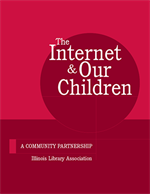- About
-
Advocacy
- Submit Legislative Proposals to the ILA Public Policy Committee
- Advocacy Policies and Procedures
- More Than a Building
- Census 2020 Resources
- Creating or Changing Illinois State Library Law
- Illinois Minimum Wage Resources
- Intro to Property Taxes for IL Libraries
- ILA Public Policy Principles
- Legislative Issues
- Libraries and Immigration Enforcement
- Making Your Case
- Ready, Set, Advocate
- TIFs and Public Library Districts in Illinois
- Top Ten Advocacy Tips
- Unite Against Book Bans in Illinois
-
Committees
- Frequently Asked Questions (FAQ) about ILA Committees
- Advocacy Committee
- Awards Committee
- Conference Program Committee, 2025
- Conference Program Committee, 2026
- Diversity Committee
- Finance Committee
- Fundraising Committee
- ILA Reporter Advisory Committee
- Illinois Libraries Present Committee
- Illinois Public Library Standards Committee
- Intellectual Freedom Committee
- iREAD Committee
- Nominating Committee
- Public Policy Committee
- Reaching Forward North Committee
- Reaching Forward South Committee
- Events
-
Forums
- Frequently Asked Questions (FAQ) about ILA Forums
- Human Resources & Administration Forum (HRAF)
- Illinois Association of College & Research Libraries Forum (IACRL)
- Library Trustee Forum (LTF)
- Marketing Forum (MF)
- Resources & Technical Services Forum (RTSF)
- Retired Members Forum
- Small and Rural Libraries Forum (SARL)
- Students and New Professionals Forum (SANP)
- Young Adult Services Forum (YASF)
- Youth Services Forum (YSF)
- Initiatives
- Membership
- Publications
In addition to the cost of installing and maintaining public access computers, one of the key issues for libraries is whether or not to install filters, especially on computers used by children and young adults. The Executive Board of the Illinois Library Association has adopted the position that filtering is a decision to be made at the local level, and not mandated by state or federal legislation.
Filtering Talking Points
ILA supports local control. Local officials—library trustees, librarians, and other professional library staff—are the most qualified to decide how Internet access should be provided to their patrons. Bills that propose filtering typically overrule all local decisions and impose a "one size fits all" approach. In opposing this type of legislation, it is especially important that school and public libraries that have installed filters call their legislators and explain that while they may have chosen that route, it was a local decision and they would not want to be subject to a statewide mandate.
- Filters Hurt Libraries
This type of legislation is an unfunded mandate that overrides local control. - Filters Don't Work
Studies have demonstrated that filters consistently block important information on science, health, political, and social issues and regularly allow objectionable material to get through. This creates new liability for libraries. - Filters Are Expensive
Paying for filters diverts scarce resources from limited technology budgets—money that could go to buying more computers, and paying for more reliable and faster Internet access. - Filters Are Inflexible
Filters don't know if the person using the computer is 5, 21, or 65. This "one size fits all" approach treats adults, even senior citizens, like elementary school children. The user doesn't even know what they are being prevented from accessing. We can't expect patrons to ask to unblock computers when they don't know what that particular filter has blocked. - Filters Are Biased
Private companies and groups with commercial, political, or religious agendas design filters to block what THEY find objectionable, including political candidates, social causes, basic health information, and even information on their own product's faults. - Filters Hurt the Poor
Economically disadvantaged communities are the most in need of technology because more of their patrons lack these resources at home. This legislation forces less-affluent areas to choose between filling this need or spending money just to block access. - Filters Are NOT the Best Way to Provide Internet Safety
Teaching patrons to use the Internet responsibly is much more effective.
Report: The Internet and Our Children
Learn more about filtering in this report on teaching our children the critical viewing and thinking skills that will help them decipher and evaluate the world of information online.


 iREAD Summer Reading Programs
iREAD Summer Reading Programs Latest Library JobLine Listings
Latest Library JobLine Listings